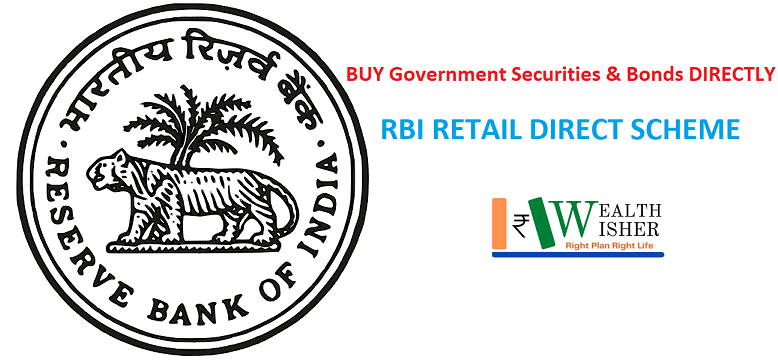Recently PM Modi in presence of Ms Nirmla Sitharaman (Minister of Finance GOI) & Sh Shaktikanta Das (Governor RBI), announced the way how retail investors can Buy or Sell in Government Securities through a new system called RBI Retail Direct Scheme or RBI RDS or simply RDS. Let’s know what is this system and how we can benefit from it.
What is the RBI Retail Direct Scheme?
Retail Direct Scheme is a one-stop solution to facilitate investment in Government Securities by individual investors. Under this scheme individual retail investors can open a Gilt Securities Account – “Retail Direct Gilt (RDG)” account with RBI.
Link to access RBI Retail Direct Scheme (RBI RDS)
https://rbiretaildirect.org.in
First of all, why Invest in Government Securities?
Government securities offer an option for long-term investment mostly. The advantages for retail investors can be listed as under:
- G-sec are risk free: G-sec in the domestic market context is risk-free and carries no credit risk.
- Long Term G-Sec offers decent yields for longer duration. G-sec yield curve extends up to 40 years. With Government issuing securities at different points on the yield curve, It is an attractive option for savers who need low risk investment options for longer durations.
- These securities offer the prospect of capital gains: As there is an inverse relationship between bond price and interest rate, there is a prospect of capital gains when the interest rates moderate. One, however, must be conscious of market risks that could result in losses in case the interest rate cycle reverses.
- G-sec have reasonable liquidity: G-sec have reasonable liquidity and can be transacted on NDS-OM. With the introduction of Retail Direct Portal, retail investors can now participate easily in primary and secondary market.
- G-sec help to diversify portfolio: Investments in government securities would help in portfolio diversification and consequently reduce risk for retail investors.
- Zero charges under Retail Direct Scheme: Retail Direct Account is completely free of charge and does not involve any intermediary. It would reduce overall transaction charges for individual investors in terms of the charges which they are otherwise required to pay for investing through aggregators or taking indirect exposure through mutual funds.
Government securities available on Retail Direct platform
i. Government of India Treasury Bills (T-Bills)
ii. Government of India dated securities (dated G-Sec)
iii. State Development Loans (SDLs)
iv. Sovereign Gold Bonds (SGB)
How To Open a Retail Direct Gilt (RDG) account?
Eligibility:
a. Retail investors who have a Rupee savings bank account maintained in India, PAN, Any Officially Valid Document (OVD) for Know Your Customer (KYC) purpose, Valid email id, Registered mobile number.
b. Non-Resident retail investors eligible to invest in Government Securities under Foreign Exchange Management Act, 1999.
Some Pointer to follow:
- An individual can open only one RDG account. The RDG account can be opened singly or jointly with another retail investor who meets the eligibility criteria.
- The second holder in a joint RDG account may also open an individual RDG account.
- Investor services will be available on logon such as account statement, nomination facility, pledge/lien, gift transactions, grievance redressal, and managing profile like contact details etc.
- RDG Account can be opened and maintained with RBI free of cost.
- Up to two nominees can be added. Investors, if they so desire, can change the nominee details through the Retail Direct portal later.
When can you access Primary market auctions?
Primary auctions are conducted generally on specified days of the week as given in the table below, these days may differ due to holidays or other considerations. Half-yearly indicative calendars are published on the RBI website. This is for Gsec long-term dated securities and Sovereign Gold Bonds. Quarterly indicative calendars are published for Treasury Bills and State Development loans. For details visit https://rbi.org.in

Minimum amount for investment through Retail Direct Platform

Maximum amount for investment through Retail Direct Platform

How can you buy securities through Retail Direct platform?
There are two ways to buy Government securities through RBI Retail Direct Platform:
i. By placing a bid in the primary auctions of dated G-Sec, T-Bills and SDLs (Non-competitive segment only, i.e., by only entering the desired amount of securities, without entering a price). For Sovereign Gold Bonds (SGBs), you may place a bid during the subscription windows announced by RBI on its website. For step-by-step details on bidding in auctions, you may refer to the User Manual on the Retail Direct Portal.
ii. Second option, by placing a buy quote in the secondary market portal.
How can you sell securities through Retail Direct platform?
You can sell securities by placing an offer (sell) order in the secondary market portal. You must have the security in your account before you can sell that security.
Securities will be credited in your Retail Direct account on the settlement date, which is typically one working day after the trade date/auction date.
Contact Details for RBI Retail Direct Scheme (RDS)
For Queries & Complaints here the detail to contact:
i. Toll free phone number: 1800 267 7955 (between 9 am to 7 pm on any working day).
ii. E-mail id: support@rbiretaildirect.org.in
iii. Raise a request on the Retail Direct portal.
For additional details on using the Retail Direct portal, you may refer to the User Manual in the Help section of the Retail Direct Portal.









It is one of the best investment scheme from Government of India.
Thx… I too agree the scheme has potential.